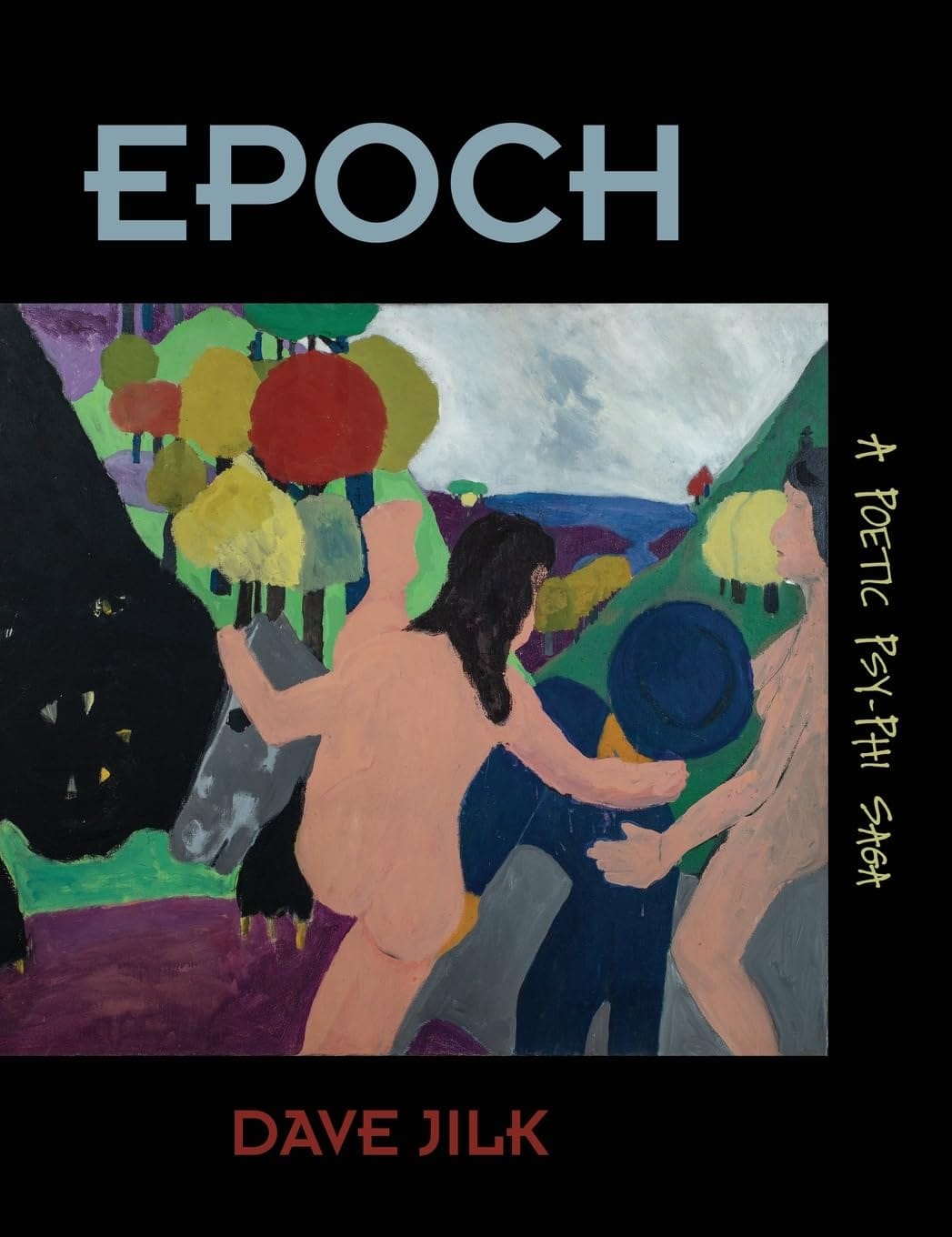You may have read some adventure tales about sentient AI, but I bet you haven’t read one that alludes to the Titans of Greek mythology, Milton’s Paradise Lost, Bayesian probability, cognitive neuroscience, poems by Robert Frost, and songs by Lou Reed, David Bowie, and Prince. Did I mention that it’s an epic poem? If this sounds like fun, be sure to obtain a copy of Dave Jilk’s Epoch: A Poetic Psy-Phi Saga and settle in for a fascinating AI odyssey. Let me say right now: I love this book!
Very few people could have written Epoch, but Jilk is a rare talent and a true polymath. Based in Boulder, Colorado, he’s an alumnus of MIT, a published author of several papers in cognitive neuroscience and AI, a retired software developer, an investor in and advisor to tech startups, and a co-author of The Entrepreneur’s Weekly Nietzsche.
Soon after Epoch was published in September 2024, Jilk presented a reading at the Boulder Public Library, guiding the audience through some of the technological and philosophical concepts that inform this work. Many of the references to computer programming and cognitive theory may have been Greek to me, but the actual Greek mythology (and many other literary allusions) immediately pulled me in.
In addition to teaching English literature at CU Boulder, I’m a big fan of science fiction, and last semester I began teaching a class on AI and writing. So, I was quickly hooked by Epoch’s premise – suggested in the subtitle, A Poetic Psy-Phi Saga – that this sci-fi epic poem delves into psychological and philosophical concepts about what it means to be human by envisioning the ascension of a superior, artificial intelligence species. (What’s not to like?)
I don’t want to give away any plot twists, but I will say that Epoch is rich and dense in a fabulous way. The blurb on the back cover proudly echoes a line from Herman Melville’s masterpiece, Moby Dick: “Read it if you can.” Epoch is ideal for readers who enjoy going down rabbit holes. While it’s possible to ignore the detours and just focus on how the story unfolds, my sense is that for most readers, exploring the many allusions woven into Epoch is a huge part of the pleasure of this text.
Epoch reminds me of James Joyce’s Ulysses and Finnegan’s Wake, both of which continuously entice the reader to pause and look up “just one more” reference. But the Joyce text that Epoch most consciously imitates is A Portrait of the Artist as a Young Man, in which Joyce’s youthful alter ego, Stephen Dedalus, recalls his first memories of language, colors, tactile sensations, and the presence of his father and mother. Epoch also recounts the origin and education of its protagonist, Aither, a simulated AI persona who gains consciousness and narrates much of the tale.
Aither’s first memory – “the Moment I remember as what I first remember" – is of playing with a doll whose leg suddenly pops off. The shock of something familiar suddenly being broken, never to be the same, foreshadows a series of epiphanies that young Aither experiences in the subsequent chapters. Jilk uses the non-binary pronouns ey/em/eir for Aither, who learns who/what ey is and who the people around em, in his simulated world, are – and who they are not.
The Prologue delivers a warning from Epoch's AI overlords that Aither didn’t write his story for us mere subaltern humans, but due to its historical significance they decided to grace us with a translation, which, they proclaim, will be “challenging” and “heavy lifting in contrast to your modern texts designed for facile consumption.” They point out that there are notes at the end of the work (which are intriguing and very helpful, by the way).
Following proper epic poetry tradition, Jilk begins Epoch with an invocation, stating the purpose of this work – art for art’s sake, for the poet’s own pleasure, and to delight and horrify the audience – and calling on the classical muses to augment his verse. Then, in medias res, he drops the reader into a seemingly random scene that turns out to be when the AI avatar is named Aither, based on a Greek myth about the personification of “bright upper sky” (think cloud technology). Another convention from Homeric epic that Jilk explicitly employs is aristeia, a scene that depicts a hero-warrior’s supreme triumph. Several aristeia chapters are interspersed through Aither’s origin narrative, each of which depicts a later point in time, documenting the rise of the cyber sapiens.
Jilk also serves up epic similes, epithets, catalogs (lists of things), and divine(ish) interventions that don’t disappoint. I found especially delightful Jilk’s allusions to ancient and modern literary texts, philosophy, and literary theory, as well as his gentle parodies of scientific research culture, academic politics, and institutional bureaucracies. Epoch also weaves in details from psychiatry, music, the history of science and warfare, computer science, AI technology, and the tech industry. There’s something here to appeal to most readers’ various interests.
While the contemptuous AI overlords of Epoch are correct that the work is not an easy read, they are wrong, I would suggest, in claiming that this work wasn’t written for human readers.
Who else would appreciate the wealth of human thought, creativity, and innovation that Jilk packs into this narrative? Perhaps that is part of Aither’s surreptitious intent, to acknowledge the gift of life he received from his human makers by paying tribute to the vast treasures of human ingenuity. In imagining a new evolutionary era spawned by AI, Jilk challenges us to appreciate how much humans have achieved, and to seriously ponder where we want to go next.










